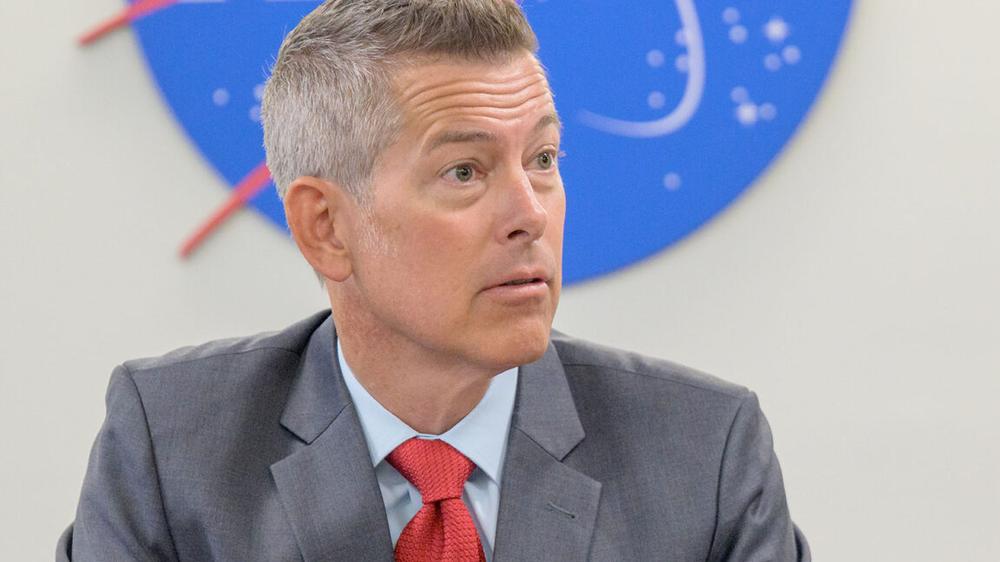Sean Duffy, the acting administrator of NASA for a little more than a month, has vowed to make the United States great in space.
With a background as a US Congressman, reality TV star, and television commentator, Duffy did not come to the position with a deep well of knowledge about spaceflight. He also already had a lot on his plate, serving as the secretary of transportation, a Cabinet-level position that oversees 55,000 employees across 13 agencies.
Nevertheless, Duffy is putting his imprint on the space agency, seeking to emphasize the agency's human exploration plans, including the development of a lunar base, and ending NASA's efforts to study planet Earth and its changing climate.
Duffy has not spoken much with reporters who cover the space industry, but he has been a frequent presence on Fox News networks, where he previously worked as a host. On Thursday, he made an 11-minute appearance on "Mornings with Maria," a FOX Business show hosted by Maria Bartiromo to discuss NASA.
NASA should explore, he says
During this appearance, Duffy talked up NASA's plans to establish a permanent presence on the Moon and his push to develop a nuclear reactor that could provide power there. He also emphasized his desire to end NASA's focus on studying the Earth and understanding how the planet's surface and atmosphere are changing. This shift has been a priority of the Trump Administration at other federal agencies.
"All the climate science, and all of the other priorities that the last administration had at NASA, we’re going to move aside, and all of the science that we do is going to be directed towards exploration, which is the mission of NASA," Duffy said during the appearance. "That’s why we have NASA, to explore, not to do all of these Earth sciences."
Many people in the space industry welcome Duffy's push to focus NASA on exploration of deep space and other planets, particularly his emphasis on the Moon. NASA's effort to establish a sustainable lunar presence could certainly use some focus, as it appears increasingly likely that, absent serious changes, China will land humans on the Moon before NASA returns.
However, in abandoning Earth science, NASA would be violating the law that created the agency, the National Aeronautics and Space Act of 1958.
This charter legislation established "the expansion of human knowledge of phenomena in the atmosphere and space" as part of the space agency's core mission. To meet this mandate, NASA has typically spent about 10 percent of its budget annually on Earth science, including key missions to observe the planet's atmosphere, monitor weather, study land use changes, and more.
"This area of research positively impacts our economy and national security beyond measure," said Lori Garver, NASA's deputy administrator from 2009 to 2013. "Ignoring scientific evidence and stripping NASA of one of its most tangible public purposes throws NASA into the fire of partisan politics. Enacting this agenda would set back our status as a global leader and risks our economic future."
Garver added that surveys repeatedly indicate that the public would increase prioritization of NASA’s research in Earth and climate science above other areas, which currently receive significantly more funding at the space agency.
Public prioritizes Earth science
Garver is referring to polls by Gallup, the Pew Research Center, and other organizations that have repeatedly found that the public's top two priorities for NASA are monitoring asteroids that could potentially strike Earth and studying and understanding our planet's climate. It is worth noting that the Trump administration has also sought to end funding for repurposing an existing spacecraft to rendezvous with the asteroid Apophis as it makes a close pass by Earth in 2029.
Multiple sources have indicated to Ars that, in his leadership so far, Duffy has largely listened to political staffers at NASA—including Chief of Staff Brian Hughes, a former Florida-based political consultant—rather than senior civil servants with engineering backgrounds. He is also carrying out the priorities for NASA established in the President's Budget Request for fiscal year 2026, which are the agency's marching orders in absence of a budget formally approved by the US Congress.
It is unclear how long Duffy will remain as "acting" administrator. Since his appointment, Duffy has been prominent in NASA's social media accounts and in news updates (for example, in the past, NASA administrators were unlikely to be quoted in a standard press release concerning a photo from Mars). He also plans to travel to the space industry's largest conference, the International Astronautical Congress, in late September and early October, in Australia. This all suggests he may remain in place for a while.
However, one source indicated to Ars that the Trump administration may be closing in on a new nominee to lead the space agency full-time. This person could be named in the coming weeks. It is difficult to see anyone being nominated who is not aligned with the priorities of Duffy and the White House Office of Management and Budget.

 Motorola Moto G55 5G (8/256 GB) in offerta: un best buy nella fascia bassa
Motorola Moto G55 5G (8/256 GB) in offerta: un best buy nella fascia bassa